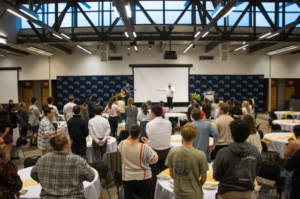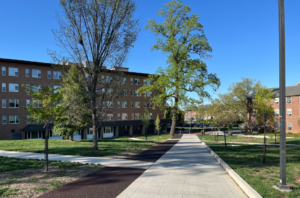Decadent Society: Has America Sealed Its Fate?

Courtesy of Institute for Human Ecology
By Renee Rasmussen
New York Times columnist Ross Douthat recently visited Catholic University on behalf of the Institute for Human Ecology to introduce his new book The Decadent Society: How We Became Victims of Our Own Success. The lecture, which took place Tuesday, February 25 in Heritage Hall, was organized as a discussion moderated by Joseph Capizzi, Executive Director for the Institute.
Douthat, an Institute for Human Ecology Media Fellow, has written on politics, religion, moral values and higher education. His newest book is a discussion of what happens when a powerful society stops advancing, and in turn how it might cause its own end.
To start off the discussion, Capizzi asked Douthat to explain decadency and how it relates to his new book. To answer this question, Douthat explained how America has become “stuck.”
“Decadency, properly understood, refers to stagnation drift and repetition at a high level of civilization development and the argument then is that this term very easily applies to America,” Douthat said.
Transitioning and getting into more depth, Capizzi then asked about the four indicators of decadency to which Douthat replied the easiest to understand is political sclerosis, which refers to an economy’s resistance to change.
“Politics is dominated by various stalemates,” Douthat said. He then explained that American government is stuck between two parties that negotiate constantly but achieve little. He then gave the example that modern presidents are lucky to pass one piece of legislation during their time in office, like Obama did with Obamacare, but then spend the rest of their careers paying for it.
“Over the last few generations it’s become a lot harder to effectively govern Western countries and effectively proform or transform build new, or undo new government programs,” Douthat said.
Douthat then said the other indicators of decadency that are harder to understand and agree with are the stagnation of economy and technology. Douthat went on to say over time America has seen a pattern of deceleration and lower growth rates, and the growth rates are achieved through a “perpetual borrowing.”
Douthat describes this as “a rich society paying itself to maintain a form of progress that its own fundamentals don’t really justify.”
When discussing technology Douthat argued that technological progress since the Apollo space travel program, has been disappointing. He explains that technology has become mono-dimension and only focused on tech, instead of improvements in places like transportation.
He argues this causes people to “spend more and more time in virtual realities and to retreat from both certain kinds of economic activity but also to retreat from family formation, romance, sex, and childbearing.”
Douthat then explained that the reason America’s decadence is important is all the factors, or indicators, are converging.
“Slow economic growth feeds political unhappiness and distrust in government, which makes it harder to pass effective policy programs, which then slows economic growth further, and drives down birth rates,” Douthat said.
To conclude his book and discussion, Douthat talked about what society is lacking, but how we should also have hope.
“The loss of a decadent society is that of possibility,” said Douthat. “The loss that it faces today is the loss of confidence that this particular society is part of a story and has a particular destiny.”
From a Catholic perspective, Douthat wants his readers to recognize that if America is a part of a story, it is currently in a very interesting part.
“Expect something stranger to happen,” Douthat said. “And maybe that stranger thing is finding a way to leap into the stars.”
This event was free and open to the public. There were about 50 people in attendance, many of whom were Catholic University students as well as professors. The event lasted about an hour and a half and was followed by a reception during which the audience could get to know Douthat and ask more questions.
“It was a great experience at the IHE talk,” said Owen Shields, a freshman International Business major. “I was able to learn more about Ross Douthat’s book and his point of view on certain cultural aspects. It was a fun time learning more about not only Dourthat and his book but also about our Human Ecology department.”








